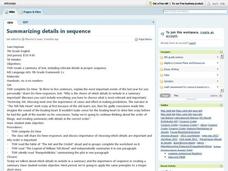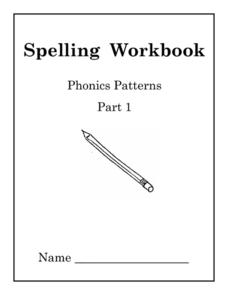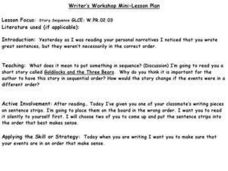Curated OER
Summarizing Details in Sequence
Seventh graders write a few sentences explaining the most important events of their lives during the past year. As a class, they discuss why they chose the elements they did for their sentences. To end the lesson, they read a variety of...
Pearson
Reading Comprehension Sequence Chain
Follow any story and record each step on the graphic organizer provided here. There are lines to record the title, author, and illustrator, boxes where pupils can fill in character and setting, and six boxes in which learners can note...
Curated OER
Pencil It In
In this recognizing patterns worksheet, students identify problems with patterns and draw the number of pencils that most likely come next. Students solve four problems.
Curated OER
Main Idea in Informational Text
Individuals complete a pre-assessment to gauge their ability to determine the main idea and supporting details in nonfiction text. They examine a new piece of nonfiction reading by looking at the table of contents, headings, and index...
Student Handouts
Shamrock Alphabet Patterns
Which letter is missing? Kids must know their alphabet in order to fill in the missing letter in each sequence. Each letter is inside of a shamrock for a fun St. Patrick's Day touch.
Curated OER
Guess That Sequence!
Young scholars explore number sense by completing problems in class. In this patterns lesson, students examine a group of numbers and identify what the pattern is and how it should correctly continue. Young scholars practice utilizing...
Curated OER
Shapes and Patterns in Art and Oceans
First graders draw, cut out, and design their own fish shapes by cutting out shapes and putting them together. In this shapes and patterns worksheet, 1st graders also construct a stamp and print patterns with stamps to repeat a...
Super Teacher Worksheets
Snowman Sequencing
Who knew that building snowmen could be educational as well as a ton of fun! This two-part learning exercise first asks learners to cut out and glue in the correct order a series of four pictures showing a child building a snowman. When...
Curated OER
Comparing Arithmetic and Geometric Sequences
In this algebra learning exercise, learners analyze patterns and identify it as arithmetic, geometric, or neither. There are 30 questions with answers.
Curated OER
Sequencing
Are you looking for a way to teach sequence of events in your narrative writing unit? Bring this lesson to your middle school class, as it prompts young writers to create a narrative sequence map of events that have happened at school...
Curated OER
Counting Numbers in Sequence 1-41
In this counting numbers in sequence worksheet, students follow the dot to dot to create a picture. In this drawing worksheet, students connect forty numbers.
Curated OER
Shape Pattern Prediction
In this pattern and sequence worksheet, students analyze the series of six shapes and from two choices, circle and color the shape that continues the pattern. There are 12 problems.
Curated OER
Continuing Patterns
For this patterns worksheet, students look at 6 different patterns and continue each pattern on each accessory in sequence as they began.
Houghton Mifflin Harcourt
We Can Do It!: Extra Support Lessons (Theme 10)
Scholars participate in chants, grand discussions, and complete practice pages in a We Can Do It! themed unit. Designed to provide extra support, the assortment of lessons cover topics such as r-controlled vowels, comparatives...
Curated OER
Toothpick Patterns
In this patterning learning exercise, students identify and complete 15 different patterns that include using toothpicks. First, they determine the number of toothpicks needed to create each figure in a given sequence. Then, students...
Curated OER
Story Sequence
In this story sequence worksheet, students read five line nursery rhymes and then number the events in sequential order. There are four nursery rhymes on this two-page worksheet. An answer key is included.
Curated OER
Main Idea in Informational Text
Readers identify main ideas and supporting details using informational texts. For this literacy lesson, they make predictions and read the text to find the main ideas. They use a table diagram to define the main idea and supporting...
Curated OER
Discussing Poetry In Class
Students investigate syllabic metre and rhyming techniques by analyzing poetry. In this language arts lesson, students read the poem Considering the Snail and discuss the nature and mood of the poem with their classmates....
Kathryn J. Davis
Spelling Workbook: Phonics Patterns
Set your pupils straight with spelling and sounds by using these materials for practice. Included here are three booklets and workbooks that cover just about any sound or blend you could think of!
Curated OER
Retelling Problems and Solutions in Chronological Order
First graders discover how to retell problems and solutions in a story in chronological order. In this chronological order lesson, 1st graders use graphic organizers to record information. Students then use this information to sequence...
Curated OER
A Mirror into History
Are we really all that different from people in the past? First, learners of all ages write an autobiographical poem. Then, they research the lives of historical figures. They use the same format that they used to write their own poem to...
Curated OER
Printing and Publishing
Explore African literature and artwork in a multicultural literacy and art lesson. Begin with a read aloud of Tiger and the Big Wind: A Tale from Africa, and afterward, have kids retell the main events in the story. They...
Curated OER
Writers Workshop Story Sequence
Students read stories and explore the importance of sequential order. In groups, students are given sentence strips. Students holding the sentence strips, place themselves in a logical order to make a story. Individually, students...
Curated OER
Story Elements - Sequence and Meaning
Students practice sequencing story elements for meaning. In this story elements lesson, students participate in a teacher demonstration in how to sequence story elements in a story about the grocery store. They break into groups by...























